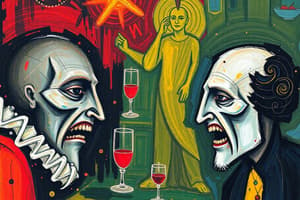Podcast
Questions and Answers
What are apparitions?
What are apparitions?
- Physical creatures
- Visions created by the Witches (correct)
- Demonic spirits
- Imaginary friends
Who is Lady Macduff?
Who is Lady Macduff?
Macduff's distraught wife
Who is Macduff's son?
Who is Macduff's son?
Macduff's child
How does Macbeth's attitude differ from the first encounter with the witches?
How does Macbeth's attitude differ from the first encounter with the witches?
What does this change in attitude show about the change in Macbeth's character?
What does this change in attitude show about the change in Macbeth's character?
Explain how the witches are stereotypical.
Explain how the witches are stereotypical.
Discuss the apparitions shown so far in the play.
Discuss the apparitions shown so far in the play.
What does the head with a helmet signify?
What does the head with a helmet signify?
What does the bloody child indicate?
What does the bloody child indicate?
What does the child wearing a crown holding a branch predict?
What does the child wearing a crown holding a branch predict?
Why does Macbeth readily accept the predictions made by the second and third apparitions?
Why does Macbeth readily accept the predictions made by the second and third apparitions?
How do the witches respond when Macbeth insists on knowing what the future holds for Banquo's children?
How do the witches respond when Macbeth insists on knowing what the future holds for Banquo's children?
In the witches' procession of kings, why do some kings carry double and triple scepters?
In the witches' procession of kings, why do some kings carry double and triple scepters?
Why does Banquo's ghost carry a mirror?
Why does Banquo's ghost carry a mirror?
What relationship do Macbeth and Macduff have at this time?
What relationship do Macbeth and Macduff have at this time?
Why has Macbeth become a ruthless, unfeeling person?
Why has Macbeth become a ruthless, unfeeling person?
How does the decision to kill Macduff's family differ from his decisions to murder Duncan and Banquo?
How does the decision to kill Macduff's family differ from his decisions to murder Duncan and Banquo?
Based on the conversation between Lady Macduff and her son, what type of person is she?
Based on the conversation between Lady Macduff and her son, what type of person is she?
Compare the characters of Lady Macduff to Lady Macbeth.
Compare the characters of Lady Macduff to Lady Macbeth.
How does the dialogue between Lady Macduff and her son affect the reader's response to their murder?
How does the dialogue between Lady Macduff and her son affect the reader's response to their murder?
How does Malcolm describe himself to Macduff in their conversation?
How does Malcolm describe himself to Macduff in their conversation?
Why does Malcolm misrepresent his character to Macduff?
Why does Malcolm misrepresent his character to Macduff?
What good news about 'gracious England' does Malcolm tell Macduff?
What good news about 'gracious England' does Malcolm tell Macduff?
What news does Ross bring Macduff about his family?
What news does Ross bring Macduff about his family?
Why might Ross be reluctant to give Macduff the news?
Why might Ross be reluctant to give Macduff the news?
What is the double meaning of the line: 'No, they were well at peace when I did leave 'em'?
What is the double meaning of the line: 'No, they were well at peace when I did leave 'em'?
How does Ross's behavior build up the intensity of the scene?
How does Ross's behavior build up the intensity of the scene?
What advice does Malcolm give Macduff in order to control his grief?
What advice does Malcolm give Macduff in order to control his grief?
What does Macduff vow? Does he react the way people do in real life?
What does Macduff vow? Does he react the way people do in real life?
Flashcards are hidden until you start studying
Study Notes
Apparitions in Macbeth
- Apparitions are supernatural visions created by the Witches, influencing Macbeth's actions.
- The apparitions include:
- A head with a helmet warning Macbeth to "Beware Macduff."
- A bloody child who reveals that no man born of a woman can harm Macbeth.
- A crowned child holding a branch indicating Macbeth will remain unchallenged until Birnam Wood moves to Dunsinane.
Lady Macduff and Her Son
- Lady Macduff is characterized as distraught and loving, serving as a contrast to Lady Macbeth's ambition.
- Her son is innocent and represents the tragic consequences of Macbeth's ambition.
Macbeth's Shift in Attitude
- Macbeth's confidence grows significantly from his first encounter with the Witches, demonstrating a change in character as he becomes obsessed with power.
- He shifts from surprise at prophecies to an expectation of greatness.
Nature of the Witches
- The Witches embody stereotypical traits: they cast spells, predict the future, and possess an ugly appearance, heightening their supernatural aura.
The Impact of Predictions
- Macbeth's acceptance of the Witches' prophecies reflects his distorted reality, showcasing his obsessive pursuit of power.
- Banquo is warned subtly about the consequences of his desires, emphasizing caution.
Banquo's Ghost
- In the witches' sequence of kings, some carry multiple scepters, signifying the rule over various realms, symbolizing power and consequence.
- Banquo's ghost holds a mirror, representing the line of kings descending from him, serving as a reminder of Macbeth's fears.
Dynamic Between Macbeth and Macduff
- Macbeth and Macduff are currently enemies, with Macduff supporting Malcolm's claim to the throne.
- Macduff's fierce opposition to Macbeth's tyranny drives the plot toward conflict.
Macbeth's Ruthlessness
- Macbeth's ambition leads him to commit heinous acts, including the slaughter of innocent women and children, a stark contrast to his previous political motivations.
- The decision to murder Macduff's family is portrayed as pure evil, lacking justification.
Emotional Parallels
- Lady Macduff, as a foil to Lady Macbeth, embodies love and innocence, highlighting the tragic results of Macbeth's ambition.
- The innocent dialogue between Lady Macduff and her son deepens the audience's horror at their impending murder.
Malcolm's Characterization
- Malcolm exaggeratedly describes his flaws (lust, greed) to test Macduff's loyalty and intentions.
- Despite disqualifying himself as a king, he reveals the support from England to overthrow Macbeth.
Macduff's Tragic News
- Ross hesitates to inform Macduff of his family's murder, aiming to keep him focused on their goal against Macbeth.
- The double meaning of Ross's line alludes to the peace found in death, intensifying the emotional impact on Macduff.
Coping with Grief
- Malcolm advises Macduff to channel his grief into anger, promoting a manly response to tragedy.
- Macduff vows to confront Macbeth, illustrating a typical human reaction to loss, demonstrating resilience and purpose in the face of despair.
Studying That Suits You
Use AI to generate personalized quizzes and flashcards to suit your learning preferences.




